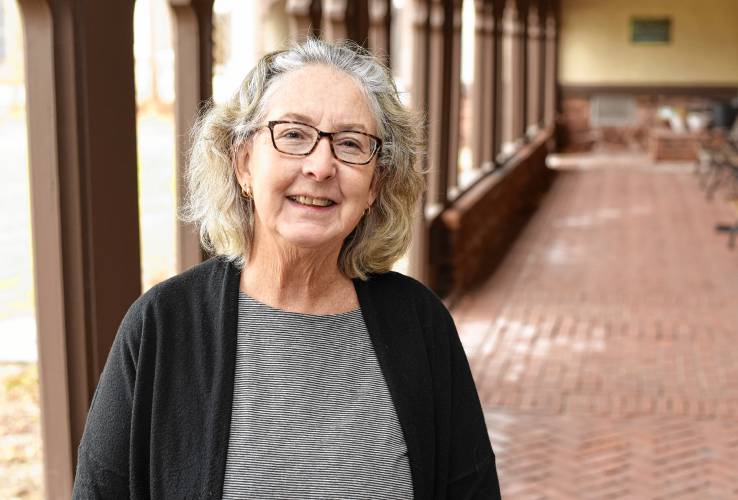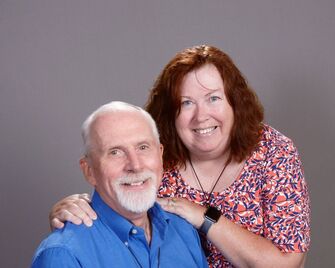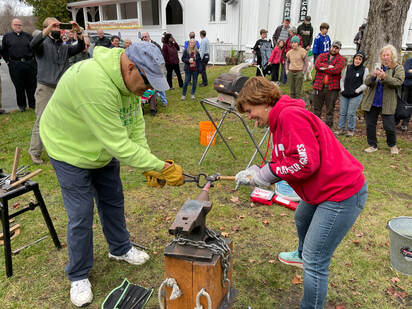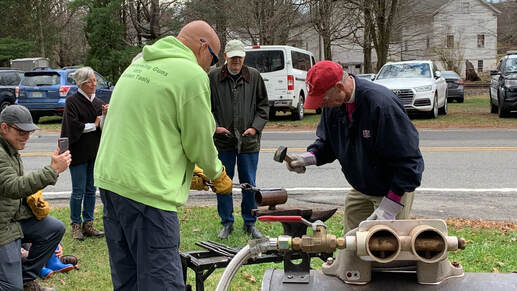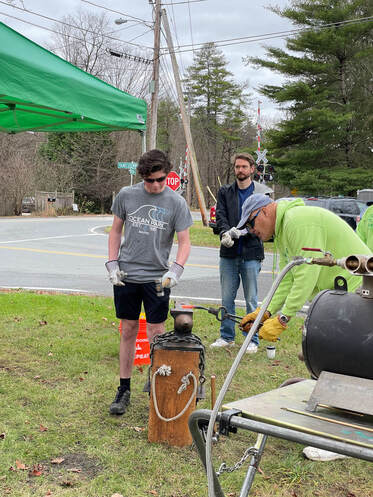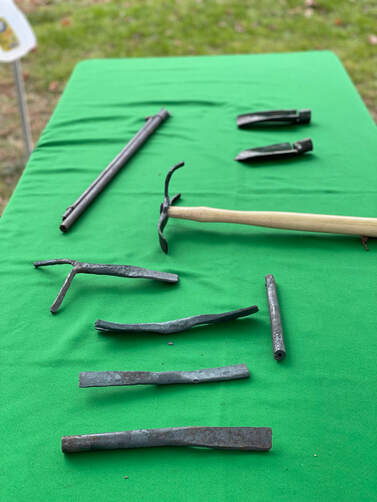|
While many Christian denominations recite one or both of the creeds in worship at least occasionally, some don’t, and I have to wonder what folks new to Episcopal worship must make of our very regular practice of standing together to articulate a list of things we believe.
Are the creeds rules? Do they express doctrines that we are expected to believe? And what if we don’t really believe some of the things we say in the creeds? Are we meant to understand the claims of the creeds literally? There are questions that I suspect we’ve all asked ourselves at times. Because the creeds are such a central part of our worship life and because they raise such tricky questions, Heather and I decided that our final “teaching sermon” in this series should explore the creeds. The word creed comes from the Latin credo, meaning “I believe”. Probably the most important thing we can say about the creeds are that they are historic documents, born in the days when the Church, the community of Jesus’ followers, was establishing itself. Like other historic documents , they reflect the concerns and issues that were important to their authors. The Apostles’ Creed is the shorter and less complicated statement of the two we use. It contains twelve faith statements. A longstanding tradition in the church was that the twelve were written by (or at least associated with) the twelve apostles. While a simple form of the creed may have been in use in the middle of the second century, the Apostles’ Creed as we now know it didn’t actually emerge until the fourth or fifth century1. What we do know is that the Apostles Creed has always been associated with baptism. From early times, new Christians about to be baptized were required to affirm their faith in the Father, the Son, and the Holy Spirit. In one of the nice examples of the Church changing its liturgy to honor and reclaim ancient practices, we now use the question-and-answer format as a means of including the entire congregation present in the affirmation of belief in the three persons of the Trinity (and other fundamental articles of faith) during the baptismal service. We use the Apostles’ Creed during the Morning and Evening Prayer, and when we bury the dead. The Nicene Creed – or, more accurately, the Niceno-Constantinopolitan Creed – is the profession of faith that we use each Sunday in the Eucharist. It’s a more complicated and arguably more interesting document with quite a dramatic history. In the fourth century, the Christian Movement had spread throughout the Mediterranean world. The Roman Emperor Constantine had converted the Christianity and established the faith as the official religion of the Empire. The Church was not of a common mind, however, but was wracked by controversies, with various religious leaders teaching different and often conflicting doctrines. Constantine wanted to bring about peace and unity, and so in 325 he summoned all Christian bishops to Nicea for the first Ecumenical Council of the Church. He imposed a mandate: because religious peace could only occur if a single religion existed throughout the empire, none of the bishops would be allowed to leave until they had agreed on a universal interpretation for Christianity.2 (I imagine this to have been rather like a mother saying to a pair of quarreling siblings “Nobody leaves the room until you two have sorted this out!”) And so the bishops began what would ultimately turn out to be a decades-long debate that must, at times, have been a rather dog-eat-dog process: eventually conclusions were reached about what constituted true and authentic Christian belief, and alternative perspectives were declared to be heresies. Most of the controversies involved relationships between the persons of the Trinity. Bishop Arius of Alexandria and his followers, for example, taught that although Jesus Christ was begotten by the Father, “the Son” did not always exist, and was not of the same nature as the Creator. Macedonius I of Constantinople, meanwhile, taught that the Holy Spirit was not really divine. Both positions (and others) were eventually declared to be heretical, when the bishops took their votes, and bishops who refused to sign on to the agreed-upon definitions of Christian belief were exiled. Following, Nicea, a series of further councils continued to refine the creed established in 325. The final form of the creed that we use today emerged from the Council of Constantinople in 381. The finely-tuned language that we speak together each week reflects the deeply-held convictions of those early Church Fathers, that Jesus Christ was eternally begotten of the Father, God from God, Light from Light, true God from True God, begotten, not made, of one Being with the Father. Another line in the Nicene Creed that has been a source of considerable dispute comes in the part of the creed referring to the Holy Spirit. The creed from Nicea, confirmed by subsequent councils, stated that the Holy Spirit, the Lord, the giver of life proceeds (or issues, or emanates) from the Father… In the sixth century the Church in Europe, under the authority of the Pope in Rome, added the phrase “and the Son”, so the declaration of faith professed that the Spirit issues from both the Father and the Son, the Creator and the Christ. The Orthodox (Eastern) Church vehemently objected to the addition. Their concern was both that the addition was theologically untrue AND that the Bishop of Rome had no authority to change the common creed. In our own time, most of us grew up with the amended “and the Son” version. The Church in its wisdom has, in the last several decades, chosen to return to the earlier (and more truly ecumenical) form of the creed, which is why we now, in our own worship, say that the Spirit proceeds “from the Father”. Another change to the way the Church has approached the creed has been to shift from an individual statement of faith to a communal expression. Those of us raised on the 1928 Book of Common Prayer declared that “I believe”, while we now say that “We believe”. It seems to me that this change reflects a larger shift in the Church, in our lifetimes, anyway, from a primary emphasis on our personal relationships with God and our own salvation, to a recognition that it is through our connections with one another and our efforts together that we live into God’s dream for the healing of the world. All of the disputes and controversies associated with the creed over the centuries, considered in relation to the troubles that cause the suffering in the world, can seem trivial. It is hard to project ourselves into the minds and hearts of the people of faith for whom these fine points of language mattered so deeply and profoundly, for whom these words represented our very relationship with God. Which point brings me to one of the tricky questions that I asked earlier. Do we HAVE to believe all of the things we say in the Creed to be literally true? Here’s my answer. All of the language that human beings use in our attempt to explain God, salvation, the Church, and other elements of our faith is symbolic. Our words – and for that matter our attempts to express the truth of God in art, music, or any other form – can never capture the full reality of God and God’s dream for us, because these truths are beyond our imagination. Our words (and our images and our melodies) point toward the truth of God and God’s love for us in the life of Jesus the Christ, and of the Spirit that blows among us, but they cannot capture it. As Saint Paul said, we see in a mirror dimly. Our attempts, including the words of the creeds, are the scribblings of children in relation to the glory of God. I love the explanation of late Bishop John Shelby Spong: The church of the future will not dismantle and dispatch the gospel narratives, but will recognize them for what they are, a first-century attempt to explain the Christ experience. We will not jettison the creeds, but will recognize them as fourth-century love songs, sung to those people's understanding of God. We can thus join in singing these ancestral songs. We do not literalize their words, nor do we bend the church of tomorrow to the liturgical patterns of antiquity. We will allow the Christ experience to create new forms through which ultimate truth might be allowed to flow in our time.3 For me, the speaking of the creeds is a statement of faith in and solidarity with the universal Church, with the generations of questioning, struggling, faithful folks who have wondered and who have longed to love God and follow Jesus. The creeds tie us back to those who have gone before us, to those all over the world speaking the same words in myriad languages today, and and to those who, God willing, will continue to do so for generations to come.
Welcome to our celebration of Saint Andrew the Apostle, one of the patron saints of our community. I would like, first, to share some of what I learned about Andrew. As many of you know, he is the patron saint of Scotland. He is also patron saint of Barbados, Georgia, Ukraine, Russia, Sicily, Greece, and Cyprus and many more. Additionally he is the patron saint of fisher persons, fishmongers, and rope makers, as befits his early life as a fisherman; yet he is also the patron saint of singers, miners, farm workers, and pregnant women. Until I began researching Saint Andrew, I was unaware of how many groups of people might claim a saint.
In today’s Gospel, we learn that Andrew and his brother Simon, called Peter, were the first disciples called to follow Jesus. That they quickly left their fishing and followed Jesus may seem a bit crazy. But there is a different memory of how Andrew became Jesus’ follower found in John 1:35-42, where we learn that Andrew was a follower of John the Baptist. Andrew and another of John’s followers were standing next to him when he watched Jesus walk by. John said, “Look, here is the Lamb of God!” Andrew and the other disciple immediately turned and began to follow Jesus. Ultimately they went with Jesus to the place he was staying. They ended up staying the night and listening to Jesus, after which Andrew immediately went and found his brother, Simon and told him, “We have found the Messiah,’ and brought Simon to Jesus. I think that likely makes Andrew the first missionary, as he brought the first new follower to Jesus. We don’t often hear of Andrew in a prominent leadership position. He is not part of the “inner circle” (Peter, James and John). Much of the time that we hear of Andrew in scripture, we hear him referred to as the brother of Simon Peter, almost as though he has no identity apart from that. Still, Andrew was a leader, if a quieter and more unassuming one. For example, it was he who brought the boy with the loaves and fishes to Jesus. Later, when some Greeks ask Philip if they could be introduced to Jesus, Philip appeals to Andrew for help. Andrew is a quiet leader. He seems to simply do what the occasion calls for. The more I read about Andrew, the more I liked him. He seemed to me to be unassuming, yet willing to do whatever was needed. His leadership style might be less dramatic than Peter, James and John, but I don’t think he lacked the ability to lead. I think I became a bit of a fangirl for Andrew, due in large part to my impression of him as a man deeply rooted in faith and love. I think that he went to find Simon Peter and bring him to Jesus because Andrew was convinced that Jesus was truly the messiah, and his love for his brother made him want to share this amazing discovery. Third century church historian Eusebius wrote that Andrew traveled north to Scythia after the resurrection, but little is known of his life beyond that. Tradition holds that Andrew was crucified in about the year 60CE, on a diagonal cross as he believed he was not worthy to be crucified on the same type of cross as Jesus was. Still, my impression of Andrew reminds me of the importance of saints on our faith. My impression of Andrew’s faith rooted in love, inspired me to think about the need to spread Jesus’ love to everyone we meet - not through words, but through acting in love as Jesus did, and as I believe Andrew did. We need our saints to set an example for us, to show us how to be our best selves. As I noted earlier, today’s Gospel was pretty straightforward. The second lesson was puzzling to me. How do we become more like Andrew? How do we step out in faith and love to serve others as Andrew did? Clearly, if we are following Andrew’s example, we do not need to make a big production of what we do. We just need to remember that our loving and generous God expects us to follow the example of Jesus and of Andrew. One of the people I spoke with about Andrew and about remembering how lucky we are to have such a loving and generous God, told me that she had simplified this down to three sentences during Covid. She was determined not to be about fear and sadness throughout the pandemic. Instead she repeated three simple phrases to herself, “I am grateful. I am blessed. And it will be okay.” As I thought about it, I realized it was a very reasonable mantra for anyone who has a bit of apprehension in the face of trying to step out in love to serve God’s people. Thank you Cheri Ann. It seems to me that the reading from Romans speaks to God’s love for God’s people, and God’s desire for us to spread that love generously as we were taught by the way Jesus lived his life on earth. The reading from Romans says, “‘No one who believes in him will be put to shame.’ For there is no distinction between Jew and Greek; the same Lord is Lord of all and is generous to all who call on him.” This is the way of Jesus; this is the way Andrew learned from him. This is the way of leading with love. I believe that we are the children of a generous God. A God who so loves us that he sent his son to teach us how to live. Jesus lived a life of love and service, and that is the life we are called to as well. In the second half of the reading from Romans, we hear that there are all kinds of obstacles to people calling on God’s help when needed. How can they call on a God they do not know, and how can they come to know God unless someone tells them of God’s existence? Romans again, “So faith comes from what is heard, and what is heard comes through the word of Christ.” It is up to those who have heard the word of Christ to share it with others. This does not mean we have to stand on street corners and preach. It means we have to walk out in love to serve our brothers and sisters, no matter who they are. When we began Emmaus Companions, we knew that preaching on street corners was not a good way to let people on the margins know that they are loved. By accepting our brothers and sisters on the margins with love, not judgment; remembering to listen, not preach; accept that we do not understand all that they are going through, but trying to learn how to walk with them, made us companions on their journey; trustworthy and caring. Sometimes we have seen people fall off the wagon or get involved in a fight with someone who used to be a close friend or die from an overdose or freeze to death because they had no shelter. It seems to me that we need more people walking out in love to help folks find food or shelter or an agency that deals with whatever problem they have. I know Emmaus Companions could use the help, and so could the Sunday Sandwich ministry or Second Helpings. These are just a few ways that we can spend our love. We have a wonderful church community, with so many amazing ministries. We are a people with big hearts. We follow the examples of our patron saints and step out in love. There is great reward in doing the work of Jesus. In fact, it can change our lives. I have never regretted a moment spent in the prayer corner or at table on Monday night’s Second Helpings meal; or walking on the street to listen to the many people we have been privileged to meet through Emmaus Companions. Those are the ministries I know most about, but there are many more at James and Andrew. Just look around a bit and I suspect you will be able to find a ministry suited to your talents. Once again I think of our reading from Romans, “How beautiful are the feet of those who bring good news!” My prayer for you and for me is that we find a way to bring good news to all who long to know that they are loved - regardless of who they are. Amen Yesterday, our family joined folks from across our diocese for an event they co-sponsored with Christ Trinity, Sheffield; St. Paul’s Stockbridge; Grace, Great Barrington; and Swords to Plowshares Northeast. The Rt. Rev. Jim Curry, a retired Bishop Suffragan in Connecticut is the chief blacksmith for Swords to Plowshares. This ministry was inspired by the prophet Isaiah, who proclaimed: “...they shall beat their swords into ploughshares…” (2:4) Their organization works with local police departments, taking guns that have been bought back from the community and then turning them into garden tools. What we witnessed yesterday was beautiful, and I will tell you why, but first, I want to share why I think addressing gun violence matters so much. For me, it’s always been personal. My father was an avid hunter. He was also an alcoholic, whose disease took over his life during the course of my early childhood. When I was four years old, my mom came home from her shift at the naval air station, to find my father passed out in a recliner, with a loaded handgun next to him. He was supposed to be watching me. When I was six years old, we came home from church to find him intoxicated and angry, to the point he became violent. This was not a new behavior, but it was the first, and only time, I actively watched him physically harm her. She sent me to the neighbor to call the police. They refused to call, for fear the police might find their stash of illegal drugs. But as a six year old, I didn’t understand that. All I remember was feeling a deep sense of injustice that adults would sit by and do nothing while an innocent person was being harmed. That sense of injustice has never left me, and it has shaped who I am, and why I care so deeply about God’s call for us to love one another, no matter how inconvenient or costly. Like many of you, I remember exactly where I was, and what I was doing when the news broke, telling us what our neighbors in Newtown, Connecticut were going through on December 14, 2012. In my first few years at former St. James, on the anniversary of Sandy Hook, we would hold a vigil, commemorating the lives lost to gun violence, and encouraging folks to work towards gun reform. It was at one of these events that I first spoke to a high school student, who had been coming to church with her mom some Saturday nights: Meaghan Burns. Meaghan was a young woman who had a spark of joy, love, and curiosity that lived in her eyes; who loved her family and friends beyond measure. A young woman who was a seeker; open to seeing the spiritual and the way God moved in the world. A young woman who took our confirmation class, and was confirmed by Bishop Doug. A young woman, who served our country as a Navy Corpsman, traveling throughout Europe, and most recently serving as a medic at the Portsmouth Naval Hospital in Virginia. On May 4, 2019, Meaghan got out of bed to support her friend Shianne Soles, who was going through a difficult break up. Shianne’s ex-boyfriend, Donavon Moora, had brought back some of Shianne’s personal effects, and Meaghan had accompanied her to the security office on base for the exchange. Afterwards, the two women headed to a convenience store, one mile off base for some chips and water. It was there that Moora shot and killed Meaghan and Shianne, before driving a mile down the road and committing suicide. Meaghan was 23 years old, and she left behind a mother, father, sister, and friends who carry this loss with them everyday. Yesterday, Meaghan’s mom, Carolyn, spoke at the Swords to Plowshares event. She said many important things, but there is one I want to lift up this morning. When sharing Meaghan’s story, she shared the fact that prior to heading to Portsmouth, Meaghan had been training to serve as a field medic in the Middle East. Having one’s child serving in a war zone is a terrifying prospect for any parent. Meaghan underwent grueling training, and ended up injuring both her knees, and was unable to complete the training. Carolyn said: “I never thought I would be happy, thrilled really that my daughter was hurt. I was so relieved. From there, Meaghan was sent to Portsmouth Virginia to work at a naval hospital. I was so happy. Not only was my daughter staying stateside, she would be on the east coast, just hours away…I was so grateful she would be safe.” “The irony of it all is that if Meaghan had gone with the Marines and been deployed, she probably would still be alive. It is safer to be on the front lines of the battlefield than in the streets of the United States.” This was one of the first times Carolyn has used her voice as a prophetic call for change. This is no small thing. It is my sincere hope that our community can continue to pray for Carolyn as she finds ways to tell Meaghan’s story and work for change. Yesterday, Bishop Jim reminded us of some alarming statistics, and I’ve included a few more from the Pew Research Center from 2020:
Given those numbers, I know in this room there are more unspoken stories. Those of you who witnessed or experienced domestic violence and/or suicide, gun related or otherwise. We have a violence problem in this country in every possible form. Which is why it is so powerful to see guns voluntarily removed from people’s homes and turned into the police. Then watch Swords to Plowshares take weapons for destruction and turn them into garden tools that are donated to community gardens, agricultural high schools, or as donation incentives to cover the costs of this program. The vegetables that are grown in those gardens are then donated to soup kitchens, homeless shelters, or go towards community meals and food banks. Swords to Plowshares writes on their website: “The process allows us to find a creative way to make something inspiring and symbolic out of a weapon of death, something that will symbolize the transformation we believe is possible if Americans step back from the heated gun debate and try to listen to each other.” At yesterday’s event, Bishop Jim broke out his forge, and participants were encouraged to help hammer a section of a gun down into their final shape of a garden tool. It was inspiring to watch folks from across our diocese, Bishop Doug, and especially, Carolyn, take the hammer to bring about change. In that moment, it was possible to get a tiny glimpse of the future Isaiah speaks of in today’s passage, when he proclaims there will someday be a new heaven, and a new earth. As we head back into the world today, I want to encourage us to do some more labor intensive reflecting:
|
We are blessed to have a diversity of preaching voices in our parish. Our guild of preachers is a mixture of lay and clergy. We hope you enjoy the varied voices. Meet our Preachers
All
Archives
July 2024
|
